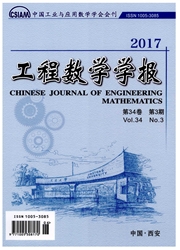

 中文摘要:
中文摘要:
本文针对信号采集系统的特性对流形学习方法性能的影响尚不明确这一问题,采用理论分析和模拟实验的方法,研究了信号采样系统的非线性、零点漂移等特性对流形学习算法性能的影响.结果表明,当信号采样系统的特性保持相对稳定时,流形学习方法可以在一定程度上容忍系统存在的非线性和零点漂移效应.为了使流形学习算法达到较好的效果,在数据的搜集和预处理过程中,应使得数据容易重构到一个高维空间中且它们之间的相似性易于度量.从而,本文的研究结果为流形学习方法在机械故障诊断中的应用提供了一定的理论基础.
 英文摘要:
英文摘要:
Currently, it is still not clear how the characteristics of a signal sampling system affect the performance of a manifold learning technique. This paper investigates the influence of the nonlinearity and zero-drift of a signal sampling system on the performance of a manifold learning technique theo-retically and experimentally. Based on the obtained results, the following conclusions can be yielded. When the characteristics of the signal sampling system maintain stable relatively, manifold learning can tolerate the existence of systemic nonlinearity and zero-offset effect to a certain extent. In order to make a manifold learning algorithm achieve good performance, it requires that the collected data should be easily reconstructed into a high-dimensional space and the dissimilarity between them can be reasonably measured. Therefore, the research results in this paper lay a theoretical foundation to the application of manifold learning methods in machinery fault diagnosis.
 同期刊论文项目
同期刊论文项目
 同项目期刊论文
同项目期刊论文
 期刊信息
期刊信息
